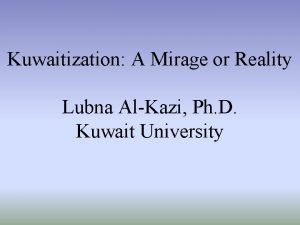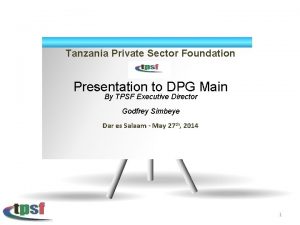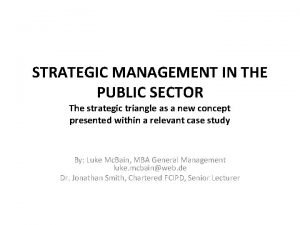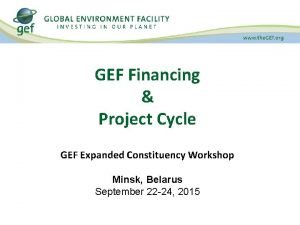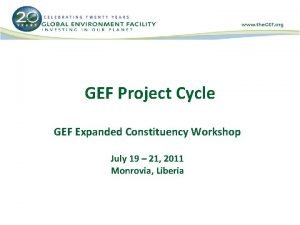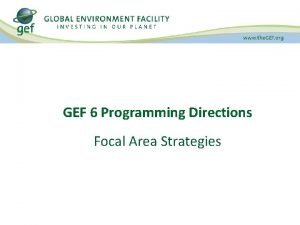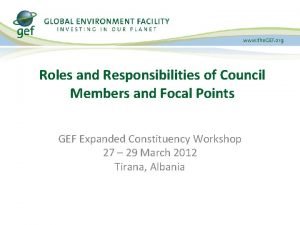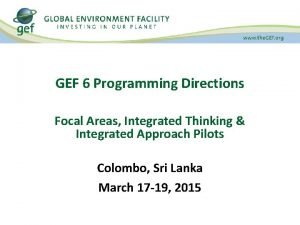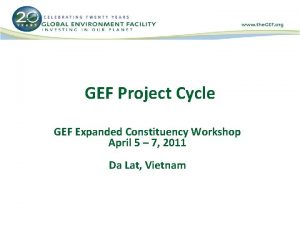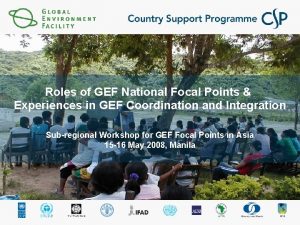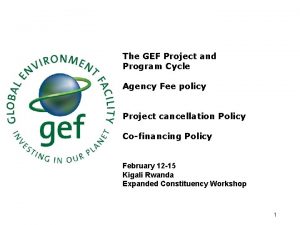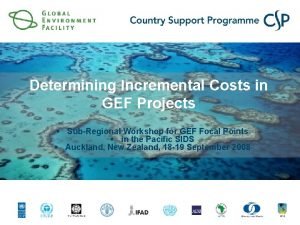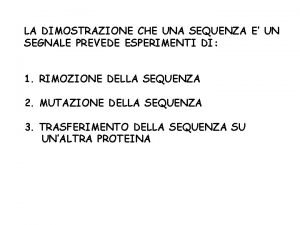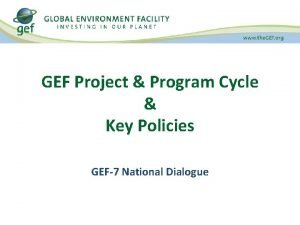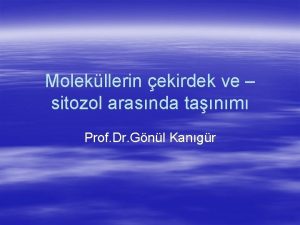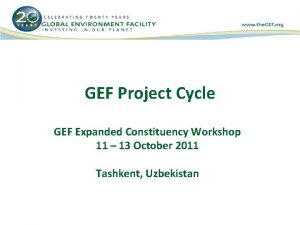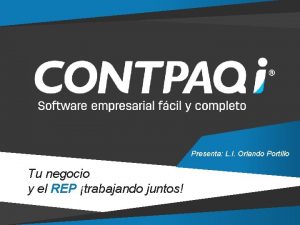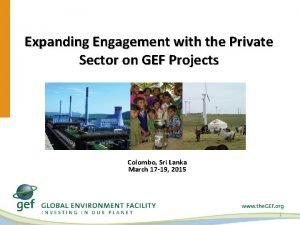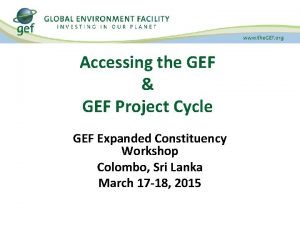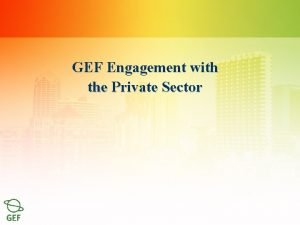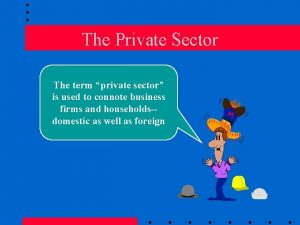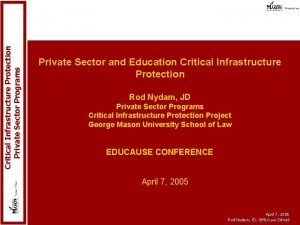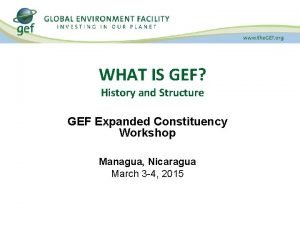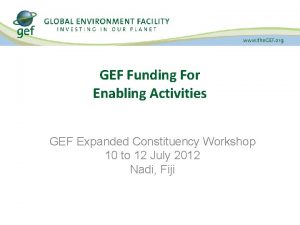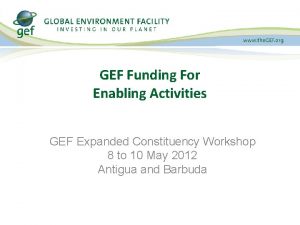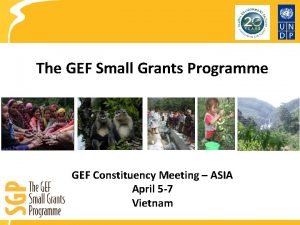Expanding Engagement with the Private Sector on GEF



















- Slides: 19

Expanding Engagement with the Private Sector on GEF Projects Lake Victoria, Uganda July 21 -22, 2015 1

Expanding Private Sector Engagement in GEF Projects (1) Private sector engagement is not new; but GEF projects can deliver more by partnering on sustainable business models and attracting more investment for environmental benefits During GEF-5 the Council approved five innovative PPPs (three in LAC) with a total funding commitment of $70 million which has attracted $907 million in cofinancing potential to generate re-flows • The IDB Sustainable Caribbean Basin Private Equity Fund ($15 Million - cofinancing $200 million) seeks to foster private investments that promote energy security, environmental sustainability and related economic opportunities in nations across the Caribbean Basin. Ø highly innovative investment platforms and business models that expand access to clean and safe energy, achieve the sustainable use of natural capital, and generate opportunities for local businesses and low income populations, including women and indigenous people 2

Expanding Private Sector Engagement in GEF Projects (2) • The IDB MIF PPP Program ($15 Million – co-financing $266 Million) is making targeted equity investments in funds to promote energy efficiency, renewable energy, and bio-diversity in Latin America. Ø investments will contribute to energy savings, new renewable energy supply, reduction of greenhouse gas (GHG) emissions, preservation of natural resources, protection of bio-diversity, and development of sustainable business models. • The IDB Climate-Smart Agriculture Fund For The Americas ($5 Million – cofinancing $50. 9 Million) is catalyzing greater private sector investments in sustainable agriculture, forestry and rangeland systems in order to maintain and improve the flow of agro-ecosystem services from productive landscapes in the face of climate change and increasing resource scarcity. Ø focuses on the synergies between private sector funds and agricultural development funds. It will also be the first fund tailored to incentivize private sector investment in climate-smart agriculture. 3

Expanding Private Sector Engagement In GEF-6 we are pursuing: 1. Mainstreaming - seeking private sector engagement in all projects 2. Integrated Approach Pilots - targeted pilots 3. Non-grant instrument Pilot - special set-aside 4

(1) Non-grant Instrument Pilot (NGI) Ø 115 Million $5 million will be reserved for the Sustainable Cities Integrated Approach Pilot Ø Objective to support the achievement of the GEF’s objectives through the use of non-grant instruments for targeted investments that promote global environmental benefits Ø Until now, non-grant instruments have not been used in the GEF’s engagement with public sector entities we expect this to happen Ø The use of non-grant instruments under the GEF-6 Pilot will be focused on instruments that have the potential to generate reflows contribute to the GEF Trust Fund’s financial sustainability 5

(2) Non-grant Instrument Pilot (NGI) Ø By demonstrating and validating successful models for the use of nongrant instruments, the GEF can help catalyze large-scale changes through broader adoption and generate experiences which may also be useful for other international environmental funding mechanisms Ø Selection criteria: • Demonstrate use of non-grant instruments in areas other than climate change • Demonstrate innovative application of financial mechanisms and partnerships that may be broadly adopted and can be scaled up; • Support innovative engagement of the private sector and public sector through innovative business models; • Deliver high levels of co-financing 6

(3) Non-grant Instrument Pilot (NGI) Ø For projects/programs with private sector recipients, the GEF Partner Agency will negotiate an appropriate concessional rate or return on investment, which, consistent with the Agency’s regular practices no necesita carta de endoso de PFO Ø For projects/programs with loans to public sector recipients, the Pilot will use differentiated terms: • LDCS and SIDS: 40 years maturity, 10 years grace period, 0, 25% interest • Non LDCS - SIDS: 20 years maturity, 10 years grace period, 0, 75% interest Ø In case of the use of guarantee instruments for public sector entities, the reflow schedule and fees will be negotiated on a case-by-case basis by the GEF Partner Agency 7

Typical types of private sector actors for GEF projects Type Description/Examples 1 Capital providers ▪ Pension funds, VCs 2 Financial intermediaries and facilitators ▪ Investment banks, commercial banks, financial advisory services 3 a Industry players – large corporations ▪ Large retail, manufacturing companies, project developers, etc. 3 b Industry players – SMEs ▪ Full time staff below 250 or less depending on the country 3 c Industry players – individuals/ entrepreneurs ▪ Small start-ups with full time staff below 10 8

Benefits of Private Sector Engagement The private sector can strengthen partnerships and make contributions to environmental and developmental solutions, such as: 1. Additional funding 2. Expertise/skills/knowledge 3. Innovation 4. Technology transfer 5. Phase out substandard products 9

Reflections on selected GEF projects in this region We reviewed a few GEF projects to learn: > Was the private sector part of the problem and solution? > Is there an essential contribution of private sector stakeholders in the project? > What results or lessons learned can provide insights for future private sector engagement? We used the GEF intervention models to review these projects 10

The GEF regularly uses five intervention models 1 Transforming policy and regulatory environments 2 Strengthening institutional capacity and decision-making 3 Deploying innovative financial instruments 4 Convening multistakeholder alliances 5 Demonstrating innovative Approaches 11

Transformation of policy and regulatory environments Capacity Strengthening and Technical Assistance for the Implementation of the Stockholm Convention (GEF ID 3948/3968 -3969) UNIDO/UNEP Focal Area POPs Objective of the Project Strengthen and build the capacity to implement the Stockholm Convention and the sound management of chemicals in ECOWAS and COMMECO LDCs and SIDS. GEF Assistance with developing comprehensive legislative and regulatory frameworks for chemicals management required toward the elimination and reduction of POPs. Private Sector Best practices and lessons learned Private sector consultation on the regulatory framework for chemical management development process. Complementary “division of labor” between the two implementing agencies, with UNEP providing guidance on policy, legislative and regulatory framework. Private sector participates with its technical capacity and capital investment in public private partnerships pilot projects. 12

Strengthening institutional capacity and decisionmaking processes Capacity Strengthening and Technical Assistance for the Implementation of the Stockholm Convention (GEF ID 3948/3968 -3969) UNIDO/UNEP Focal Area POPs Objective of the Project Strengthen and build the capacity to implement the Stockholm Convention and for the sound management of chemicals in ECOWAS and COMMECO LDCs and SIDS. Private Sector Participates with its technical capacity and capital investment in public private partnerships to create micro- or small enterprises based on innovative technologies to: (i) produce biobotanical pesticides; (ii) recycle plastic bags; and (iii) recycle used paper and e-waste. GEF Assistance with strengthening the technical and financial capacity for chemicals management, including training to the government and public private partnerships, required toward the elimination and reduction of POPs. Best practices and lessons learned Complementary “division of labor” between two implementing agencies, with UNIDO identifying and designing pilot projects that include private sector participation. 13

Deploying innovative financial instruments Geothermal Power Generation Program (GEF ID 4626) World Bank Focal Area Climate Change GEF Objective of the Project Reduce GHG emissions in Djibouti and increase electricity access of Djibouti’s population through renewable (geothermal) energy. A blend of GEF’s grant and nongrant instrument used to foster private sector participation in the energy sector through risk reduction (by subsidizing the drilling of four geothermal production wells). Private Sector Best Practices and Lessons Learned The project is a risky investment for private sector only mitigated through the use of GEF funds. A non-grant instrument is designed into the project, allowing the National Government to recycle unused funds into future geothermal drilling activities, which will leverage private funds. Competitive call for tender to engage the Drilling Services Company (DSC) that will execute the drilling program. 14

Establishment of multi-stakeholder partnerships Payment for Ecosystem Services (PES) to Support Forest Conservation and Sustainable Livelihoods in Mozambique (GEF ID 5516) FAO Focal Area GEF Multi Focal Area Support capacity building to implement and monitor a PES mechanism for the disbursement of 20% of all government taxes and fees collected from the use of wildlife and protected areas to local communities. Objective of the Project Promote biodiversity conservation and climate change mitigation while creating financial resources. Private Sector Forest concessions, including charcoal producers for the domestic and international market, will pay taxes, of which 20% will feed into a fund managed by the PES scheme / A joint venture of public and private companies. Best practices and lessons learned An alliance of the project’s stakeholder helped align incentives for the successful implantation of the project / joint venture helped sponsor a scoping study (involving research institutions) to trigger private sector interest in investing in ecosystem services. 15

Piloting Innovative Approaches Geothermal Power Generation Program (GEF ID 4626) World Bank Focal Area Climate Change Objective of the Project Reduce GHG emissions in Djibouti and increase electricity access of Djibouti’s population through renewable (geothermal) energy. Private Sector A follow on project meant at developing a geothermal power plant will be financed by the private sector, provided that the resource is confirmed for commercial power generation GEF In conjunction with the reduction of risk, the project provides the direct financial benefit of reducing the geothermal power plant cost, should the GEF-funded geothermal fuel exploration be successful. Best practices and lessons learned The GEF investment helped reduce the geothermal power “entry cost” that has effectively halted Djibouti’s development of the resource and private equity investments. 16

Private sector engagement exercise > Would private sector engagement contribute to environmental benefits and my projects? > Identify specific actions to engage the private sector and include private sector in project design and implementation. > Think about who you would need to involve, through the project design, which agency, why. > Examples include 1) forestry: private sector alliances to help design lacking regulatory policies and 2) e-waste: corporate partners. 17

Documents and Publications 18

Your Questions or Ideas! Contact your country support representative. More information is also available at the following link: www. thegef. org/gef/privatesector 19
 Kuwaitization
Kuwaitization Tanzania private sector foundation
Tanzania private sector foundation Are sole traders in the private sector
Are sole traders in the private sector Public sector strategic management
Public sector strategic management Gef project cycle
Gef project cycle Gef project cycle
Gef project cycle Gef6
Gef6 E student gef
E student gef Focal point
Focal point Gef focal areas
Gef focal areas Gef project cycle
Gef project cycle Roles of gef
Roles of gef Gef project cycle
Gef project cycle Gef
Gef Gef project cycle
Gef project cycle Sequenze segnale
Sequenze segnale Gef
Gef Ran gef
Ran gef Gef
Gef Https://mifactura.gef.mx
Https://mifactura.gef.mx
